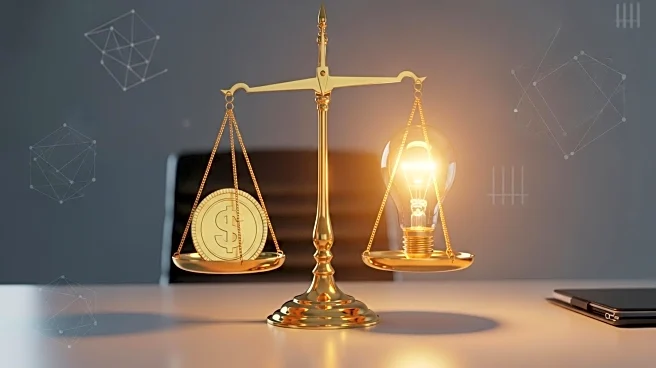What's Happening?
Tether has announced the launch of USA₮, a new dollar-backed stablecoin designed to comply with U.S. regulatory standards under the GENIUS Act. This act, signed by President Trump in July, mandates strict rules for dollar-backed tokens, including liquid reserves and monthly disclosures. USA₮ will be issued by Anchorage Digital Bank, with Cantor Fitzgerald serving as custodian and primary dealer. Bo Hines, former White House crypto adviser, has been appointed CEO of the initiative. Tether CEO Paolo Ardoino anticipates significant expansion over the next 12 to 24 months. The launch aims to ensure the dollar remains a trusted foundation in the digital asset space.
Why It's Important?
The introduction of USA₮ marks a significant step in the stablecoin market, particularly in the U.S., where regulatory compliance is crucial. This move could enhance Tether's market share and influence in the American financial landscape, potentially affecting liquidity and adoption rates of digital currencies. The GENIUS Act's regulatory framework may set a precedent for future stablecoin issuances, impacting how digital assets are integrated into traditional financial systems. As stablecoins become more mainstream, they could play a pivotal role in digital transactions, affecting both consumers and businesses.
What's Next?
Tether's expansion with USA₮ is expected to unfold over the next 12 to 24 months, with potential implications for the stablecoin market and broader financial systems. Stakeholders, including financial institutions and regulators, will likely monitor the rollout closely to assess compliance and market impact. The success of USA₮ could influence other stablecoin issuers to adopt similar regulatory frameworks, potentially leading to increased competition and innovation in the digital currency space.
Beyond the Headlines
The launch of USA₮ underlines the growing importance of regulatory compliance in the cryptocurrency industry. It highlights the balance between innovation and regulation, as companies navigate complex legal landscapes to expand their offerings. This development may also prompt discussions on the ethical and legal implications of stablecoins, particularly concerning transparency and consumer protection.











